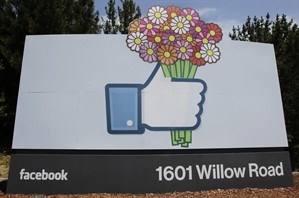
FILE - In this Sunday, May 13, 2012, file photo, flowers are added to a Facebook sign in front of Facebook headquarters in Menlo Park, Calif. (AP Photo/Paul Sakuma, File)
February 14, 2014 - 10:50 AM
NEW YORK, N.Y. - With 1.23 billion users in all the flavours and up-and-down stages of romantic relationships, Facebook knows a thing or two about love.
For example, two people who are about to enter a relationship interact more and more on Facebook in the weeks leading up to making their coupled status official — up until 12 days before the start of the relationship, when they share an average of 1.67 posts per day.
Then, their Facebook interactions start to decline — presumably because they are spending more time together offline. But while they interact less, couples are more likely to express positive emotions toward their each other once they are in a relationship, researchers on Facebook's data science team found.
Touching on everything from religion to age differences, Facebook has been disclosing such light-hearted findings in a series of blog posts this week, with one coming up later Friday and another, on breakups, Saturday. Friday, of course, is Valentine's Day.
Facebook data scientist Mike Develin, whose background is in mathematics, notes that the relationship stuff is sort a side project for his team, the findings geared more toward academic papers than Facebook's day-to-day business. His "day job" is Facebook's search function — how people use it, what they are searching for that isn't available and how to make it more useful.
But the patterns Facebook's researchers can detect help illustrate just how useful the site's vast trove of data can be in mapping human interactions and proving or disproving assumptions about relationships. Can horoscopes predict lasting love? Forget about it.
"We have such a wide-ranging set of data, including on places there may not be data on otherwise," Develin said, adding that because Facebook knows a lot about people's authentic identity, there are "almost no boundaries" to the kinds of questions the researchers can explore — about the structure of society, culture and how people interact.
Someday, researchers studying Facebook data may be able to predict whether a couple will break up, learn whether people are happy together or see what makes relationships last. Of course, the data has its limits — not everyone is on Facebook and not every Facebook user shares everything on the site.
Still, people share quite a bit. When looking at breakups through the lens of changed relationship statuses (see: "Joe Doe is single"), the researchers found couples who split up and got back together — and dutifully documented it on Facebook — 10 or 15 times a year. The maximum, Develin, recalls, was a couple who went in and out of a relationship 27 times in one year. While one may assume that a couple wouldn't want to broadcast so much relationship drama to the world, people actually "very faithfully update Facebook at each twist and turn," he says.
Facebook's researchers use aggregated, anonymized data from hundreds of millions of users on the site. This means that while they see information such as age, location, gender, a person's relationship status, for example, such data is not tied back to a specific person.
It was in a study of 18 million anonymized Facebook posts exchanged by 462,000 Facebook couples that researchers delved into how "sweet" couples are to one another on the social networking site.
"For each timeline interaction, we counted the proportion of words expressing positive emotions (like 'love,' 'nice,' 'happy," etc.) minus the proportion of words expressing negative ones (like 'hate,' 'hurt,' 'bad,' etc.)," writes Facebook data scientist Carlos Diuk in Friday's blog post. The data is plotted on a graph, which shows a visible, general increase in the proportion of warm fuzzy feelings right at the start of a relationship.
____
Online:
Facebook's Data Science page will share a blog post at 3 p.m. Friday on now couples interact just before and after their relationship starts, and another, on breakups, at 3 p.m. on Saturday.
Check here for the updates: https://www.facebook.com/data
___
Reach Barbara Ortutay on Twitter at https://twitter.com/BarbaraOrtutay
News from © The Associated Press, 2014